Inspectres by Green Intern
None
Original SA post Inspectres: “Because it’s not just a vampiric infestation – It’s your vampiric infestation!”Part 1

Inspectres is a game written by Jared Sorenson, and published in 2009 by Memento Mori Theatricks. The illustrations are by Jon Morris and Manning L. Krull . It’s a sort of comedy-horror take on Ghostbusters combined with some mechanics that hearken to Reality Ghost TV, like Paranormal State, Ghost Hunters, or A Haunting. I’ve only run the game once, but I think I should be able to give my honest opinion about what I like and dislike with the system. Feel free to disagree with me (or correct me!) if you’ve played it and think I got something wrong. It’s a pretty short book (80 pages), and is relatively rules-light, so we’ll see how much I can eke out of it.
I will say this now, though: overall, I think it’s a fun idea, but there are some glaring problems with certain aspects of the rules. That’s for a later update, though. Let’s start at the beginning, shall we?
The Premise of Inspectres
In the world of Inspectres, supernatural and paranormal events are on the rise, so much so that they are well-documented, recognized, and enough of an annoyance that there is a market for removal services. Inspectres, Inc. is a small startup/franchise chain that’s attempting to fill this niche. The players themselves take the role of the poor saps who’ve decided that hunting these ghosts and ghouls (and mummies, and aliens, etc.) is better than a 9-5 job.
The actual setting of the game is left essentially entirely open, although the baseline setting is some urban/metropolitan area. There’s no reason that the game won’t work in a rural area, though. The reason for the wide-open setting is that the players and GM often trade off in narrating and setting the scenes, based upon the success or failure of skill rolls, but that’s for another post. The author calls his game “collaborative storytelling without a net.”
He’s wrong, because there is a net, and it’s made of razor wire. Again, we’ll deal with that a bit later.
Character Creation
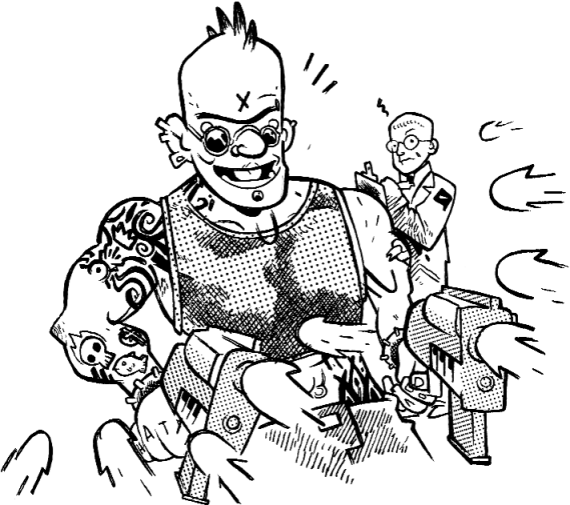
Employee of the month.
The character creation section is fairly brief. It first advises the players to create a name and basic personality for their character, including a former occupation. Players are encouraged to try and keep their characters at least somewhat grounded, since Inspectres, Inc. is a business, and is probably not going to hire crazy gun nuts or completely antisocial people. Of course, there are always exceptions. Players also select a talent for their character, which represents a special area of expertise.
The meat of character creation is assigning your skills. Characters get 9d6 to assign between 4 skills, which are:
* Academics – Used for researching forbidden tomes, theorizing, and recalling important facts.
* Athletics – Running, Jumping, Punching, Flexing. Also covers most any form of combat.
* Technology – Fixing stuff, rigging up ghost-traps, and using high-technology weapons like Proton Packs and the like. Technology is also used when determining what equipment you can purchase or have access to. No reason for the low-tech party to have a Mini-Large Hadron Collider!
* Contact – Literally your ability to talk to people, generally clients. It’s specifically stated that it’s not for use on anything but normal people.
Inspectres, Inc. is a “shoot first” kind of operation when it comes to creepy-crawlies.
No skill can have more than 4 dice in it, or less than 1. So by necessity, you’ll probably end up with a relatively balanced character.
Talents are an additional perk that every character has. They represent an additional area of expertise, and grant a character an extra die to roll whenever it would apply to a skill. Following the game’s somewhat freeform philosophy, Talents can apply to any skill area, as long as it makes a certain degree of sense. The book gives a couple examples:
Inspectres Rules posted:
So if your ex-mechanic gets into a scrap, boost your Athletics roll by using a monkey wrench as a weapon. If your agent is sexy as all-get-out, maybe you can get the team a good deal on a used car (a bonus to the Technology roll).
Skills never improve their base values. Instead, players can accrue bonus dice of various kinds, which can be applied to rolls. I think that this post is long enough, though, so I’ll cover that in the future. We'll also be getting into some of the more problematic stuff soon.
NEXT TIME: We learn how to run a business.
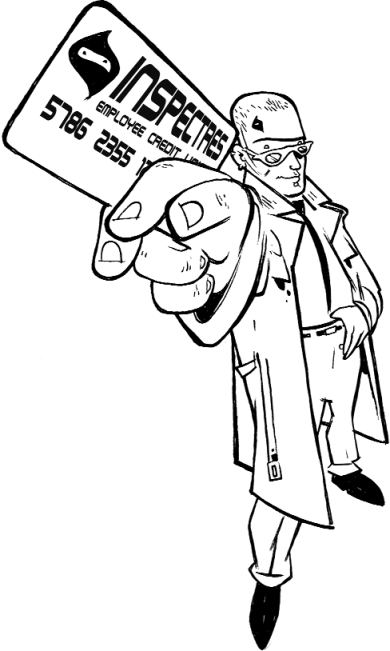
Put it all on the company card.
Taxman, leave me alone: Franchises in Inspectres
Original SA post Inspectres: Fighting the Forces of Darkness so you don’t have to!Part 2
Taxman, leave me alone: Franchises in Inspectres.
So last time, I went over the basics of making a character. This time I’ll cover another important aspects of the game: creating your Inspectres Franchise.
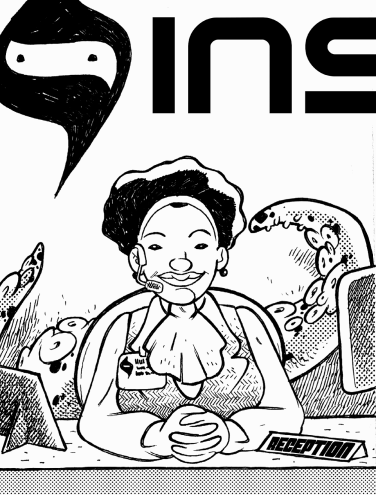
How can we help you today?
Your group of Inspectres Agents isn’t just some motley crew of paranormal investigators – they’re a motley crew with a company credit card. The strength and resources of your franchise are something that actually have an effect on skill rolls within a given mission.
Franchises are created after everyone has made their character, and the author has provided some helpful questions to get players thinking about what they want out of their business, including:
• How big is your franchise? How long have you been in operation?
• Are you the Main Office? An established franchise? A start-up operation?
• Where is your franchise located? How many people work there?
• Who runs the show? A board of directors or the agents themselves?
• Do investors privately fund it or did you all max out your credit cards?
• What does your franchise look like? What amenities does it feature?
• Are you the only InSpectres franchise in the area? Are there any competitors?
• What kinds of gear do you have access to? What do you use for transportation?
• Do you have a specialty (ghosts, vampires, demons, crypto-zoology)?
These are all very reasonable questions, and I’m glad that they’re there. New players especially might not be as comfortable roleplaying or getting invested in a game setting.
The Technology skill also comes into play during this process – the GM is instructed to ask players to roll Technology whenever a significant piece of equipment or detail comes up. A new copy-machine might require a minor success on the roll (rolling a 4. More specifics in a later post), while a state-of-the-art ectomorph containment unit might require something more major (rolling a 5 or 6). In addition, succeeding on these Tech rolls allows players to elaborate further on the purchased equipment. It’s all up to negotiation between the players and GM, of course, as are most things in the game.
Players are also encouraged to decide who should be the Chief Executive/Financial/Technical Officer, along with any other positions that they might want to include. These don’t grant any special abilities, but they do help inform roleplaying decisions, and could conceivably be the spark for some good interaction between players.
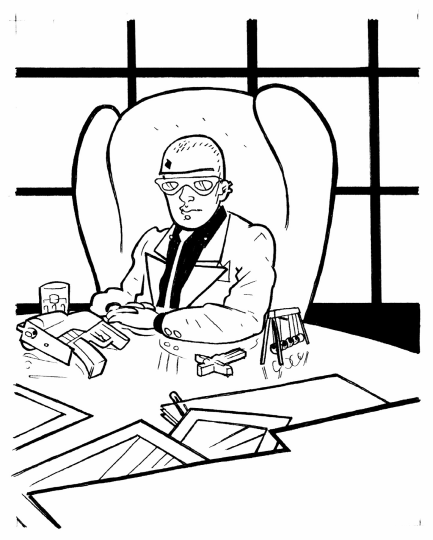
Unless of course, all of the players decide that the CEO gets some kind of SMG as a perk. Then it matters.
After deciding the flavor details of the franchise, the players get to decide the dice pools – yes, more dice pools! This stage of making a franchise is very much like making a character, which is a good move on the part of the designer. The players are given a certain number off Franchise Dice to distribute, ranging from 5d6 for a completely new branch, all the way up to 30d6 for The Main Office. You could have more, I guess, but that’s “just silly” as the rules say.
Like with characters, there are different areas to divvy up dice for a Franchise. The difference is that there are no restrictions on the number of dice in the three categories, unlike with skills. The categories are as follows:
• Library Card – The library card represents academic resources, like access to the Inspectres Main Database, or an archive of dusty old occult tomes. It is used to add dice to Academics rolls.
• Gym Card – The gym card represents access to training facilities, firing ranges, and really nice swimming pools. It is used to add dice to Athletics rolls.
• Credit Card – The credit card represents…a credit card. Its only use is to help you purchase new and dangerous technology, and to cover the costs of technical training. It can be used to add dice to Technology rolls.
It’s recommended that players divvy their dice up according to the strengths of the team, but there’s nothing stopping players from dumping all of their dice into the Gym Card, so they can have the buffest agents. Any dice that are not assigned to one of these three categories go into
The Bank – Dice in the bank can be added to any skill roll, which might make you think that you should dump all your Franchise Dice in there so that you can have maximum flexibility. That’s not a good idea, though, because dice can be lost during gameplay, both to bad Bank Dice rolls and to Stress, which is essentially the GM’s way of dealing damage. Dice in the Bank can be used to alleviate the effects of Stress, but this also removes them from play. You can imagine why it might not be a great idea to spend them all over the place.
I’ll talk more about Stress, skill checks, and how to complete missions in the next post, since they’re strongly linked, and I've got a fair bit to say about them. For now, let’s make some characters, and set them up with a Franchise.
Dipper Pines

Academics: 4d6
Athletics: 1d6
Technology: 2d6
Contact: 2d6
Talent: Sneezes like a Kitten
Mabel Pines

Academics: 1d6
Athletics: 2d6
Technology: 2d6
Contact: 4d6
Talent: Aggressively Optimistic
Soos

Academics: 1d6
Athletics: 3d6
Technology: 3d6
Contact: 2d6
Talent: Amiable Sidekick with a Pickup Truck
Inspectres Franchise Dice
-Library Card: 2d6
-Gym Card: 2d6
-Credit Card: 0
-Bank: 1d6
So Mabel and Dipper operate a very small branch out of their Grunkle Stan’s Mystery Shack. They have some access to occult lore, and a lot of places they can run around and get prepared for all the physical exertion of missions. They're totally out of cash, though. At least they have an Amiable Sidekick with a Pickup Truck! We’ll see how they get into (and out of) trouble in the next update, when we get into the real mechanics of the game. It’s going to get messy.
Who ya gonna call (when you don’t have any money)?
Original SA post Inspectres: Who ya gonna call (when you don’t have any money)?Part 3
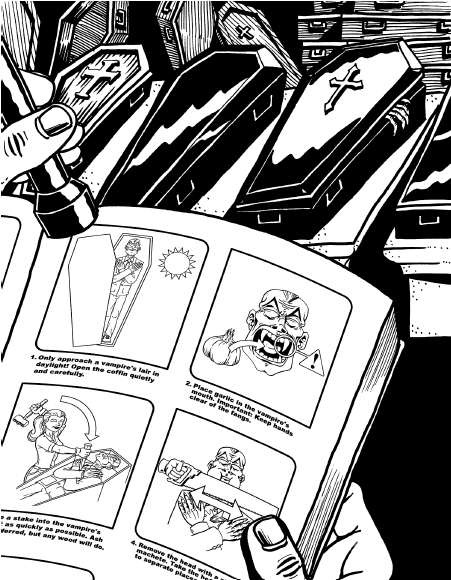
Some Disassembly Required
Skills, Stress, and How to Succeed at Missions!
We’re finally getting to the more mechanical side of things. We’re also getting to the part of the game system where I feel there are some serious design flaws, so that’s fun. This might be the last post I do, since there's not much else to the system beyond some supplemental bits.
Missions and You
Obviously, every Inspectres Franchise needs to actually get paid in order to survive and thrive. A mission is basically one session of play (this game really lends itself to one-shot adventures, but you could definitely string several together into a longer overall campaign)
Game flow generally follows this helpful list:
• Employee Interviews – Did I forget to mention this earlier? The author suggests having confessional booth-style interviews to introduce characters to the party. My players really enjoyed their fake job interviews. The Confessionals are even suggested as an aid to developing scenes later in the game, if things are getting stagnant, or if someone has a funny or inventive way of adding something to the scene. Always adding, never detracting.
• Getting the Call – A client contacts the Inspectres with their problem. This can be randomly generated from a table ( roll 2d6 on each column), or the GM can present something they’ve cooked up.
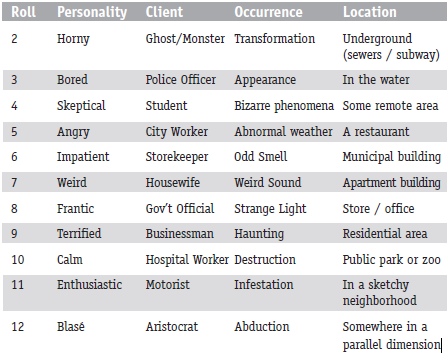
Oh Boy! The Horny Housewife heard a Haunting at the HStore!
• Research/Investigation – Research or Investigate the problem, to try and figure out an explanation or solution. Players will be rolling Academics here, more often than not.
• Suiting Up – Procuring all the equipment and gadgets they might need to deal with the problem. Or any other preparatory stuff for the actual mission. So Tech rolls to invent or purchase new gear. Contact to bargain with shady scientists. Athletics to steal shit from military labs. You get the idea.
• Fieldwork – Traveling to the job site itself, and solving the problem. This will necessarily have to follow from what the players have determined in the previous parts.
• Cleaning Up – Transfer Franchise Dice to Cards or to the Bank.
• Vacation – Spend dice to remove stress penalties from agents.
Obviously, this doesn't need to be a strict flowchart of events, save for Getting the Call and Cleanup/Vacation. Throughout all of this, players will be rolling their Skills, in order to find out more about the client, the job, and how they can solve the problem at hand. The twist is that who gets to narrate the story changes based on the degree of success. Yup.
Skill Rolls and Augmenting
Inspectres is a collaborative storytelling game, with some light skill roll mechanics. Skill rolls are called for essentially whenever the players are doing an action that would move the plot forward. So in the research and investigation phase, players might be rolling to determine the true source of the client’s misery (beyond “there are strange noises in my attic”). Results are determined by the following chart:
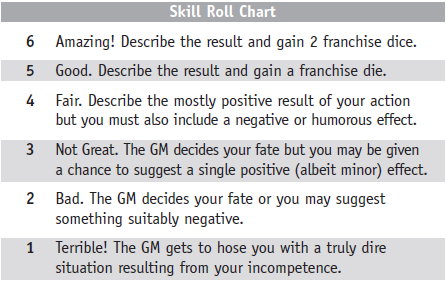
So, let’s take Dipper as an example here. Dipper heard that Lil’ Gideon’s show had something strange about it, so he decided that he’d do as much research on the pint-sized psychic as he could. The GM calls for an Academics roll. Dipper has an Academics skill of 4, so he rolls 4 dice. Sadly his talent (sneezing like a kitten) doesn’t apply here. His dice come up as 1, 3, 4, and 3.
For skill rolls, you only look at the highest die rolled, and discount all of the others. Dipper’s roll is a minor success! Dipper’s player decides that he finds out that Gideon’s amulet is granting his powers, but that in the process of the Investigation, Gideon falls in love (creepy, creepy love) with his sister, Mabel. Play then continues following these new developments in the story. The next time that a skill roll is required, the story will evolve from those results as well (and will probably get even crazier).
A negative roll should not result in the players being irrevocably screwed over, but it does mean that there’s a setback involved. If Dipper’s player was really worried about getting a bad roll, he could take a 4 (a minor success) on the Academics skill roll, because he has 4 dice in that skill. If he were to somehow lose dice in his Academics skill, he would no longer be able to take a 4 on those skill rolls.
If Dipper’s player wanted to go for broke and try to ensure that he got a 5 or 6, he could Augment his roll, either with dice from the Library Card (or another card, for another roll) or with dice from the Bank.
Augmenting involves spending dice from Cards or the Bank. Dice used from cards are always lost after rolling. Bank dice have a chance to be saved (or even multiply!) when you roll them, so they should be rolled separately from the normal dice to avoid confusion. There is significant risk involved in rolling Bank Dice, so it shouldn’t be done lightly. This is because you check each and every Bank Die rolled against the results on the chart, which means you’re far more likely to suffer a bad roll that cancels out any successes if you’re rolling multiple bank dice. It seems needlessly cruel to me, but it isn’t the worst part dice mechanic of the system. That falls to Stress Rolls, which I’ll be covering at the end of this post.
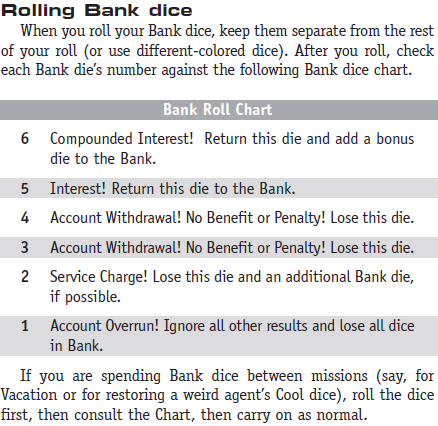
Roll a 6, 6, 6, and 1? Well Jared Sorenson says Fuck You.
Players can also assist each other. This is done by another player or players declaring the assist, rolling their skills as normal, and then passing one die (preferably a high one) to the player performing the major skill roll. They don’t even need to use the same skill, either. Dipper could be translating the spell destroy Gideon’s amulet from his tome (Academics), while Mabel tries to distract Gideon (Contacts), and Soos leads the Gnome Golem away from the group using his truck (Athletics +1d for his talent!). Mabel and Soos' players can pass their best dice over to Dipper, since he's the one making the skill roll to advance the story.
Franchise Dice
You probably noticed that the top two results on the skill roll chart mention Franchise Dice. These dice are how determine how close (or far) you are from completing the mission, and they should help determine the flow of events and narration. At the start of a game, the GM should set a target number of Franchise Dice that the players need to collect from their skill rolls. The suggested amount is twice the number of Franchise Dice that the players start with, so 10 for a completely fresh team. The only caveat to all of this is that you can’t earn Franchise Dice while purchasing equipment with Technology rolls, only through actually using it to solve the case.
Ideally, once the target number of Franchise Dice is achieved, the players should also have solved the client’s problem. You can’t gain more Franchise Dice than the target number, according to the rules, but if the players are really having fun, and there’s still a bit of narration to round things off, I might let them grab a couple more. All that’s left then is Cleanup and R&R!
Cleanup and Vacation Time
This is the best part of course: You get paid. Franchise Dice earned during the mission can be funneled back into the various Cards and the Bank. Unallocated Franchise Dice don’t do anything except give you some padding for the next mission. One of the major uses (and something that I kind of hate) is that Franchise Dice can be used to remove Stress Penalties from Agents, on a one for one basis – aka Vacation Time. What’s Stress, you ask? It’s bullshit. Plain and simple.
Stress Rolls and Cool Dice, or: This is Complete Bullshit
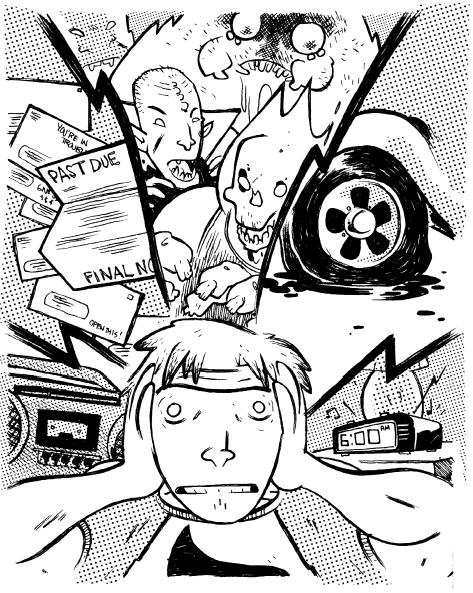
Me, reading this section
We've covered how to make your character, your business, crafted sample characters and even gone through skill rolls and mission completion. Now it’s time to get fucked over by Jared Sorenson.
Stress rolls are what the GM throws at the players to make their lives harder. They represent anything from being cut off in traffic, to coming face-to-face with Viggo, the Scourge of the Carpathians. Players will roll from 1 to 5 dice, depending on the severity of the roll. Some sample situations are listed in the book:
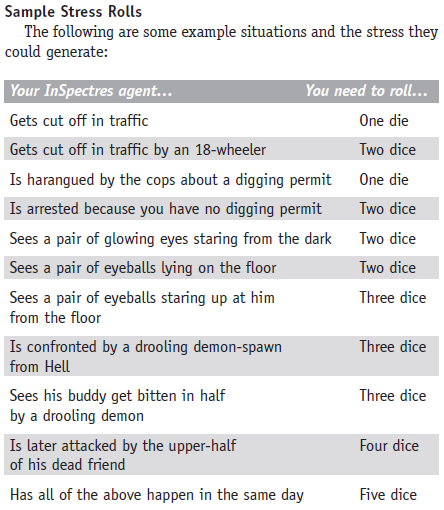
So you can see what kind of action Sorenson considers commonplace for this game. One of the problems with Inspectres as written, is that there is no guidance on how often Stress Rolls should be called for. It’s left entirely up to the GM. I suppose you could call for them whenever players get bad results on their skill rolls, but you’ll see why that’s a bad idea on this next chart. I’ve included the text from the rules, so you know I’m not making this shit up.
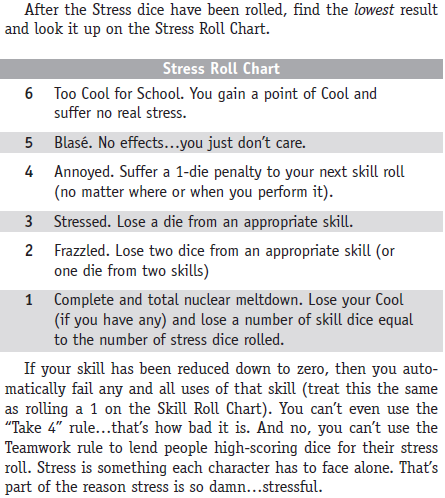
Prepare to Die Edition
That’s right. You take the Lowest Die and disregard all the others. It’s the complete opposite of a Skill roll, and the consequences are far direr, because the risk on a stress roll becomes exponentially greater as you add to its difficulty. We have 3 different types of rolling mechanics (Skill, Bank, and Stress), and the last one is riskier than the other two combined.
Cool Dice are supposed to be a way to defend against Stress, but in my experience they fall short, since they can be lost as a result of Stress Rolls. For every Cool Die you have (and you start the game with 0), you can ignore one die of each Stress Roll. Cool Dice can also be spent to remove penalties accrued by bad Stress Rolls, or as additional dice on any skill roll. The problem in this system, is that in order to get cool dice, you need to risk Stress Penalties, and once you start getting those, it becomes far harder to achieve the rolls you need to succeed on skill rolls. At the end of a mission, if you do succeed, you’ll need to spend most or all of your Franchise Dice on repairing the damage to your characters, instead of putting them into your Cards or Bank (which you may have emptied trying to make up for the skills you lost due to Stress).
If you hit 0 in a Skill, you can’t use that Skill, unless you have a talent that would grant you a die, or are willing to use dice from Cards or the Bank. Run out of dice, and you probably should have already narrated your character's grisly demise or injury.
The problem, as I see it, is that Jared Sorenson didn't intend for people to play more than single-shot games with the system, and then didn't bother to balance the Stress mechanic against the chances of players rolling 4 or lower on individual dice. The fact that you can lose accrued Cool is just insulting.
-----------------------------------
So that’s essentially Inspectres in a Nutshell. I really love the collaborative storytelling aspect and the premise as a whole, but I feel like the Stress rules as written really drag the game down. I’d recommend playing it, if you’re willing to do a little bit of tweaking to make things work better. There’s a lot more guidance sidebars for GMs, and sources of inspiration within the book itself, which is pretty nice.
There are a few other things that I could cover, including the optional Weird Agents rules (vampires, ghosts, etc), some free supplements (including a Kids Playing Pretend one). I haven’t used any of the supplements, so I’d have to give them a closer look first. There’s even also apparently a movie in production by Reactor 88 Studios, although I think that’s A) outside the purview of the thread, and B)I don’t think it’s even been released yet.